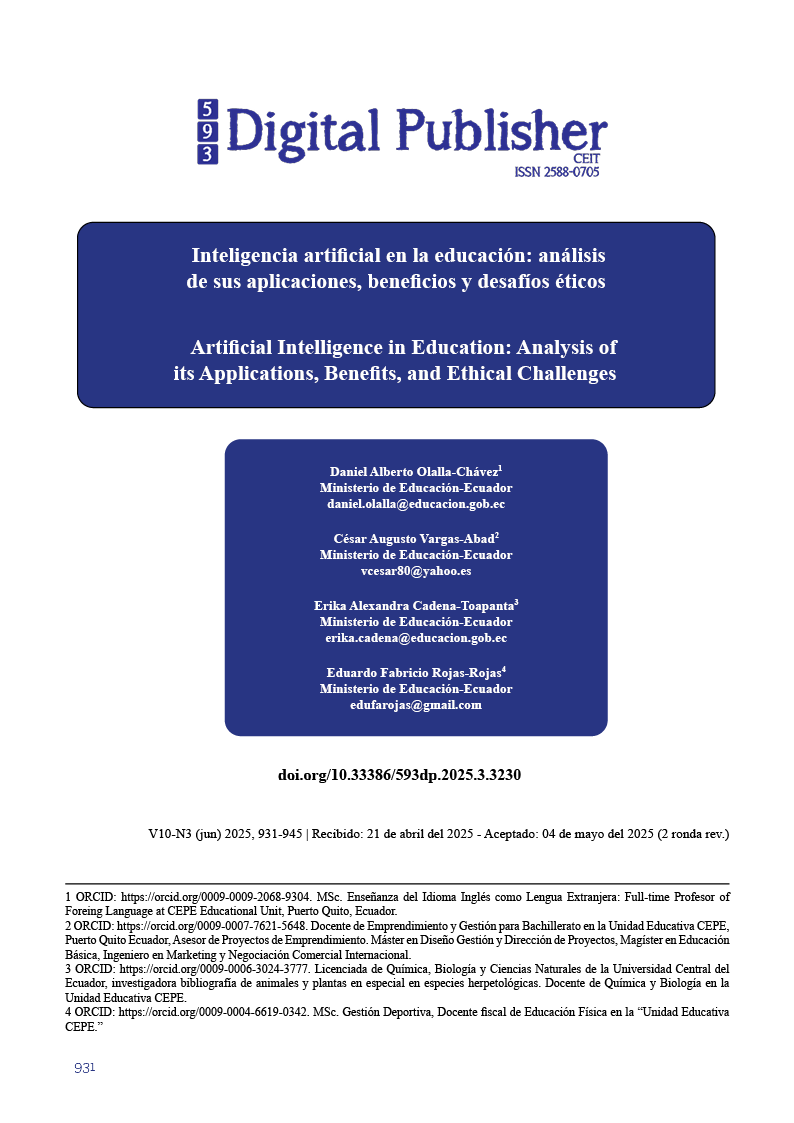Inteligencia artificial en la educación: análisis de sus aplicaciones, beneficios y desafíos éticos
Contenido principal del artículo
Resumen
La inteligencia artificial (IA) está transformando la educación actual mediante herramientas que personalizan el aprendizaje, automatizan la evaluación y promueven la inclusión. Esta investigación ampliada explora en profundidad las principales aplicaciones de la IA en la educación personalización del aprendizaje, evaluación y retroalimentación automatizada, creación de contenido educativo, e inclusión y accesibilidad incorporando hallazgos recientes (últimos cinco años) y casos de estudio relevantes.
Se analizan igualmente los beneficios asociados (como mayor eficiencia, adaptación a las necesidades individuales, mejora en resultados) y los desafíos éticos y técnicos que surgen en su implementación. Entre estos desafíos destacan la resistencia al cambio y la necesidad de formación del personal docente, los sesgos algorítmicos, la privacidad y protección de datos, así como la urgencia de contar con políticas y normativas claras.
La literatura consultada compuesta por artículos científicos arbitrados, informes académicos y estudios de caso se integra de forma crítica, destacando aportes y limitaciones de cada fuente. En conjunto, se evidencia que una adopción de la IA ética y equitativa es el factor clave para maximizar sus beneficios y minimizar riesgos, avanzando hacia un sistema educativo más eficiente e inclusivo. Se concluye proponiendo líneas futuras de investigación y recomendaciones para una implementación responsable de la IA en entornos educativos.
Descargas
Detalles del artículo

Esta obra está bajo una licencia internacional Creative Commons Atribución-NoComercial-CompartirIgual 4.0.
1. Derechos de autor
Las obras que se publican en 593 Digital Publisher CEIT están sujetas a los siguientes términos:
1.1. 593 Digital Publisher CEIT, conserva los derechos patrimoniales (copyright) de las obras publicadas, favorece y permite la reutilización de las mismas bajo la licencia Licencia Creative Commons 4.0 de Reconocimiento-NoComercial-CompartirIgual 4.0, por lo cual se pueden copiar, usar, difundir, transmitir y exponer públicamente, siempre que:
1.1.a. Se cite la autoría y fuente original de su publicación (revista, editorial, URL).
1.1.b. No se usen para fines comerciales u onerosos.
1.1.c. Se mencione la existencia y especificaciones de esta licencia de uso.
Citas
Alfaro Salas, H., & Diaz Porras, J. A. (2024). Percepciones del personal docente acerca del uso ético de la inteligencia artificial en su labor educativa. Innovaciones Educativas, 63-88. doi:10.22458/ie.v26i41.4952
Aparicio Gómez, W. O. (2023). La Inteligencia Artificial y su Incidencia en la Educación: Transformando el Aprendizaje para el Siglo XXI. REVISTA INTERNACIONAL DE PEDAGOGÍA E INNOVACIÓN EDUCATIVA, 2017-2030.
Ayuso del Puerto, D., & Gutiérrez, E. (2022). La Inteligencia Artificial como recurso educativo durante la formación inicial del profesorado. Revista Iberoamericana de Educación a Distancia, 347-358.
Boateng, O., & Bright, B. (2025). Algorithmic bias in educational systems: Examining the impact of AI-driven decision making in modern education. World Journal of Advanced Research and Review. doi:10.30574/wjarr.2025.25.1.0253
Bolaño García, M. (2024). Inteligencia artificial para la educación: desafíos y oportunidades. Praxis, 8-12.
Chicaiza, R. M., Camacho Castillo, L. A., Ghose, G., Castro Magayanes, I. E., & Gallo Fonseca, V. T. (2023). Aplicaciones de Chat GPT como inteligencia artificial para el aprendizaje de idioma inglés: avances, desafíos y perspectivas futuras. Revista Latinoamericana de Ciencias Sociales y Humanidades, 2610-2628.
Flores Vivar, J., & García Peñalvo, F. (2023). Reflections on the ethics, potential, and challenges of artificial intelligence in the framework of quality education . Comunicar, 37-47.
García Peña, V. R., Mora Marcillo, A. B., & Ávila Ramírez, J. A. (2020). La inteligencia artificial en la educación. Dominio de la Ciencias, 648-666.
Hancock, R., S, B., Azhar, S., Mezei, S., Bryne, M., & Gijsbertsen, B. (2024). Reconsidering Educational policy in the era of Generative AI. Obtenido de https://www.research.pitt.edu/sites/default/files/reconsidering_education_policy_in_the_era_of_generative_ai.pdf#:~:text=,privacy%20and%20security%20policies
Ibarra Cruz, E. (2020). Implementación de un asistente basado en inteligencia artificial para ambientes de aprendizaje de niños con discapacidad visual. Puebla. Obtenido de https://hdl.handle.net/20.500.12371/9716
Kohnke, L. (2023). L2 learners’ perceptions of a chatbot as a potential independent language learning tool. International Journal of Mobile Learning and Organisation, 214-226.
Lerís, D., & Sein - Echaluce, M. L. (2011). La Personalización del Aprendizaje: Un objetivo del paradigma educativo centrado en el aprendizaje. ARBOR Ciencia, Pensamiento y Cultura., 123-134.
López López, H. L., Rivera Escalera, A., & Cruz García, C. R. (2023). Personalización del aprendizaje con inteligencia artificial en la educación. Revista Digital de Tecnologías Informáticas y Sistemas (ReDTIS), 123-128. doi:10.61530/redtis.vol7.n1.2023.165.123-128
López Nava, I. H., & Hernández Santana, G. (2024). Sistemas de predicción de lenguas visogestuales basados en IA y su aplicación en la Lengua de Señas Mexicana (LSM). ResearchGate, 212-240.
Miao, F., Holmes, W., Huang, R., & Zhang, H. (2021). Inteligencia artificial y educación Guía para las personas a cargo de formular políticas. Paris: UNESCO, https://www.researchgate.net/publication/359960349_Inteligencia_artif_icial_y_educacion_Guia_para_las_personas_a_cargo_de_formular_politicas.
Moreno Padilla, R. D. (2019). La llegada de la inteligencia artificial a la educación. RITI, 260-270.
Norman, A. (2019). Aprendizaje automático en acción. TekTime. E-Books.
Telefónica Movistar. (2025). Telefónica Venezuela. Obtenido de https://www.telefonica.com.ve/4-de-cada-10-docentes-ya-usan-inteligencia-artificial-en-el-aula-segun-estudio-de-fundacion-telefonica-movistar/
UNESCO. (2021). Recomendación de la UNESCO sobre la ética de la inteligencia artificial. Obtenido de https://www.unesco.org
Vera, F. (2023). Integración de la Inteligencia Artificial en la Educación superior: Desafíos y oportunidades. Transformar, 17-34.





